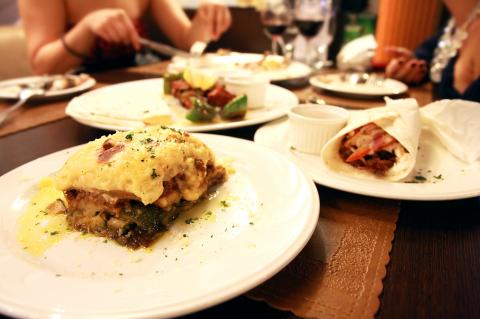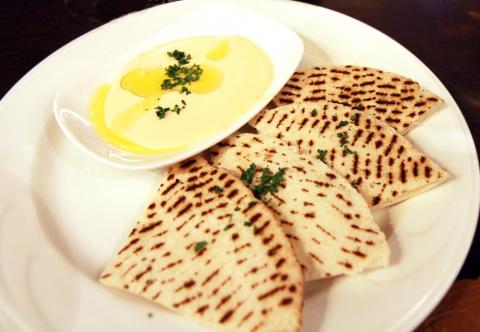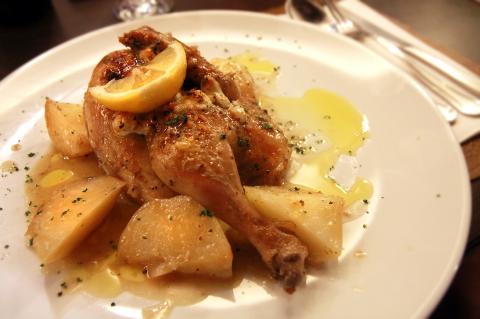Taipei lacks good Mediterranean fare, and the few places that have taken a stab at it have not lived up to the region’s many flavors. So I was skeptical when I heard news of another Greek kitchen opening up. Following my third trip in a month, however, I am convinced that Opa Greek is a bona fide culinary cruise through traditional Greece.
Opa Greek is not trying to be anything it’s not — like a white stucco hut in Santorini, Greece. Besides one mural of the picturesque town looking out over azure seas, you would never know it is a Greek restaurant just by looking at it. The homey dining room leans towards the upscale, with dark and bold furnishings that are offset by bright, maybe a little too bright, lighting.
There is something to be said about western-style service, which was consistent throughout all of my visits. An English language teacher from the US and her Philippino husband run Opa Greek. Her vision sparked interest in the parents of one of her students, and soon, they were all greeting patrons together. Their chef studied gastronomy in Greece under the supervision of an 86-year-old local woman in a 140-year-old restaurant, and those are the recipes that are offered on their bill of fare.

Photo: Olivia Wycech
The menu is extensive, so sharing is encouraged even beyond the appetizers. I suggest sharing some dips so more time can be spent with the rest of the menu. For people that have been coveting proper tzatziki (NT$130), Opa has what you are looking for. And don’t forget to try the htipiti (NT$160), a creamy blend of feta cheese and roasted red peppers that is slightly spicy. A few wedges of pita accompany all the dips. The kalamarakia (NT$220), or calamari, is breaded western style and delicately fried, served with a heap of tzatziki. I regret not ordering the spinach and artichoke fondue (NT$240), as I enviously eyed my neighbors and almost asked for a taste.
There are only three salads on the menu, and you don’t want to confuse them. The horiatiki salad (Greek village summer salad, NT$180 solo, NT$480 to share) is what made Greek salad famous, with big chunks of tomatoes, cucumbers, feta, olives and bell peppers bathed in a red wine and caper infused vinaigrette. Don’t be fooled by the Greek-style salad (NT$180 solo, NT$480 to share), which is more of a tossed salad over mixed greens, topped with a sweet Greek vinaigrette. It’s different, but still very good. Unless salad is your only dish, the solo is sized to share.
Both the greek lentil soup (NT$130) and the kakavla soup (NT$195) will remind you of that soup your mother once made that you can never just get right yourself. They are both light in flavor and density, and while smoky lentils are the main attraction of the lentil soup, the kakavla, also called the Greek fisherman’s stew, comes loaded with a variety of seafood simmered in a saffron-laced broth. Portions are small and not ideal for sharing, but definitely worth sipping.

Photo: Olivia Wycech
Remember just one word when ordering the gyros (NT$160 to NT$220) and the souvlaki (NT$250 to NT$350): lamb. Not only is mutton the meat of choice in Greek cuisine, but it’s also Opa’s specialty. The gyros are stuffed with shavings of soft and succulent lamb, red onions and tomatoes. The souvlaki, meanwhile, is much meatier. Hunks of meat are seasoned, skewered and then grilled with onions and bell peppers. Both are served with tzatziki, pita and honey mustard sauce.
There is a reason that moussaka (NT$250) is considered Greece’s national dish, and if you’ve never had it, Opa is a good place to start. Imagine a piece of lasagna minus the pasta and plus a thick — and I mean thick — layer of rich bechamel sauce that blankets a strata of beef, pork, eggplant and zucchini. The kotopolo lemonato (NT$380) came recommended and was sharp-flavored for being roasted chicken. It’s joined on the plate with feta and potatoes showered with lemon.
The desserts at Opa Greek, which I’ve tried every time I’ve gone to the restaurant, are consistently excellent. The baklava (NT$180) gets my blessing as best dessert. Phyllo pastry, walnuts and lemon honey are layered under a mound of what is perhaps the magic touch — ice cream. Even after being presented with a flaming mango (NT$250), the baklava still won out. But it was close, because triple sec drizzled over mango served on fire with ice cream is essentially a melting pot of what I imagine heaven to taste like.

Photo: Olivia Wycech

A vaccine to fight dementia? It turns out there may already be one — shots that prevent painful shingles also appear to protect aging brains. A new study found shingles vaccination cut older adults’ risk of developing dementia over the next seven years by 20 percent. The research, published Wednesday in the journal Nature, is part of growing understanding about how many factors influence brain health as we age — and what we can do about it. “It’s a very robust finding,” said lead researcher Pascal Geldsetzer of Stanford University. And “women seem to benefit more,” important as they’re at higher risk of

Last week the Democratic Progressive Party (DPP) said that the budget cuts voted for by the China-aligned parties in the legislature, are intended to force the DPP to hike electricity rates. The public would then blame it for the rate hike. It’s fairly clear that the first part of that is correct. Slashing the budget of state-run Taiwan Power Co (Taipower, 台電) is a move intended to cause discontent with the DPP when electricity rates go up. Taipower’s debt, NT$422.9 billion (US$12.78 billion), is one of the numerous permanent crises created by the nation’s construction-industrial state and the developmentalist mentality it

Experts say that the devastating earthquake in Myanmar on Friday was likely the strongest to hit the country in decades, with disaster modeling suggesting thousands could be dead. Automatic assessments from the US Geological Survey (USGS) said the shallow 7.7-magnitude quake northwest of the central Myanmar city of Sagaing triggered a red alert for shaking-related fatalities and economic losses. “High casualties and extensive damage are probable and the disaster is likely widespread,” it said, locating the epicentre near the central Myanmar city of Mandalay, home to more than a million people. Myanmar’s ruling junta said on Saturday morning that the number killed had

Mother Nature gives and Mother Nature takes away. When it comes to scenic beauty, Hualien was dealt a winning hand. But one year ago today, a 7.2-magnitude earthquake wrecked the county’s number-one tourist attraction, Taroko Gorge in Taroko National Park. Then, in the second half of last year, two typhoons inflicted further damage and disruption. Not surprisingly, for Hualien’s tourist-focused businesses, the twelve months since the earthquake have been more than dismal. Among those who experienced a precipitous drop in customer count are Sofia Chiu (邱心怡) and Monica Lin (林宸伶), co-founders of Karenko Kitchen, which they describe as a space where they